 Wild emotions
Wild emotionsSpike Jonze takes us Where the Wild Things Are...
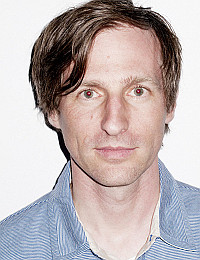
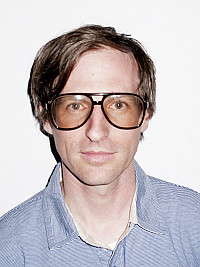
Portraits by Terry Richardson for Vice
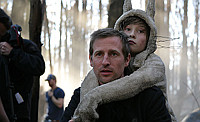
SPIKE JONZE
22.Oct.69, Rockville, Maryland






 In the last five years Spike Jonze has never not been working on his movie adaptation of Maurice Sendak's classic children's book Where the Wild Things Are. It's been a life-consuming, soul-questioning, long-day's-journey-into-night, half-decade quest for Spike to make this film according to his very specific vision for it, and it's been hugely inspiring to watch it grow and evolve. And now, like a beautiful little baby crowning the rim of the birth canal or a ripe, juicy tomato plumply twisting on the vine, Where the Wild Things Are is about to burst forth into the world. It's like no film we've seen before.
In the last five years Spike Jonze has never not been working on his movie adaptation of Maurice Sendak's classic children's book Where the Wild Things Are. It's been a life-consuming, soul-questioning, long-day's-journey-into-night, half-decade quest for Spike to make this film according to his very specific vision for it, and it's been hugely inspiring to watch it grow and evolve. And now, like a beautiful little baby crowning the rim of the birth canal or a ripe, juicy tomato plumply twisting on the vine, Where the Wild Things Are is about to burst forth into the world. It's like no film we've seen before.
Was it in your brain for a long time that you wanted to make it into a film?
No, because it was one of those things that I loved but I wouldn't have wanted to touch. I didn't know what I could add to it that wouldn't ruin it. But I've gotten to know Maurice Sendak over the last 14 years and talked to him about it occasionally. He would ask me if I would want to do it and I would contemplate it and try to think of -
Hold on, hold on. So he asked you if you wanted to do it?
It was something he was developing into a movie for the last 20 years.
It must have felt amazing to be personally asked by him.
Oh yeah. I mean, I love him, and I love his books. And since I've loved them from when I was so young - In the Night Kitchen and Where the Wild Things Are and Pierre and The Nutshell Library - those images are all so -
Ingrained in your head?
Right. When you love something from that age, you end up loving it really deeply because the images are there way down inside you. As you've grown, you've grown around them and they've just gotten deeper into you.
And then one day it clicked?
Well, I think it was probably the third time Maurice talked to me about it. He sent me a script, a draft of a script.
So he had been writing it?
No, not Maurice himself. He had worked with different writers or directors over the years and tried different versions. I read this one draft and it wasn't bad. But I realized what it could be and I got really excited. It was a really simple idea - to take the feeling of the book and expand who Max is and who the Wild Things are. And my idea was the Wild Things are wild emotions. It was that simple, but it was enough for me to know I could explore that idea and still be true to the book. I think that as a kid, for me at least, wild emotions were probably the things that were the scariest.
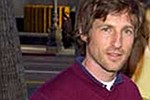
You’ve got to not be swayed by other people’s anxiety
Reading that script, suddenly I felt like with that idea, if you were going to be writing about our wild emotions, then it's sort of infinite in terms of where you can go with it. It just felt wide-open.
Did there end up being any of your own childhood in there? Is there a little bit of you in Max?
Yes, sure. I mean, even in things that I've made that I haven't written there is some of me. Even the movies I've done with Charlie [Kaufman] - I feel like I'm in those as well. But yeah, I am probably in this one to a higher degree.
You wrote this script with Dave Eggers. How long did it take you guys?
I probably worked on it on my own for around six months. That was just doing notes, free-associating, coming up with characters and ideas and themes and dialogues - really having no idea how it was going to come together. Then I went and started working with Dave and brought him all these notes and sort of dumped them on a table and we went from page 1 and just worked from there. I would say the first draft probably took four more months from that point. I moved to San Francisco and we worked every day.
What about input from studio people?
You've got to be open to listening to see if it's a good idea, because a good idea can come from anywhere. But you've also got to not be swayed by other people's anxiety. In the end, I just tried to keep to my original intention.
Which was what?
To make a movie that felt true to being 9 years old and trying to sort of navigate the world and your own emotions and the emotions of people around you.
But can we talk a little about how you made the actual Wild Things for the film?
We started with the voice performances. We shot the whole movie with the voice actors on a soundstage, on video -
Before you had costumes?
As we were making the costumes. This was just to get the voice performances down. The whole movie is based on what those guys did on the soundstage. We shot it like a movie. They 'd learn their scenes, block the scenes, and try takes exploring the dialogue. We videotaped the whole thing. We had seven cameras and seven actors. That became our reference footage for the making of the rest of the movie.
How do you do voice casting?
We listened to a lot of actors ' voices from their previous roles as we looked at still images of the Wild Things characters. Once you start isolating somebody's voice, you know, you have to think very differently. It's such a different thing from what I'd normally need from an actor.
So I guess that's the first element of the Wild Things, the voices. What about the people inside the suits?
The suit performers. They are the second element. They would watch the tapes of the voice actors and take all those nuances of what those guys, like James Gandolfini and Forest Whitaker, had done.
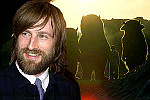
A puppet is poorly designed if doesn’t look alive when it’s sitting still
They were insanely hot. I mean, these guys were like soldiers. The movie was hard for everybody just because it was a long process, but for those guys it was a whole other level. They truly bled for it.
Wow.
They made the suits come alive, and that's not just a matter of keeping them moving. I think that sometimes there's a tendency in animation or puppetry where people are like, "Well, if it's alive it's always moving. So don't ever let it sit still." But a puppet is poorly designed if doesn't look alive when it's sitting still.
You worked on this movie for something like five years.
I know. That's too long. Five years is too long to work on a movie. It's crazy.
Well you wrote it for two years, you were down in Australia shooting for a year, and then you did post work.
It's ridiculous. It seems like another lifetime when I started it.
Excerpted from Vice magazine, September 2009. Used by permission.
For the full, much longer interview, visit VICE.
HOME | REVIEWS | AWARDS | NEWS | FESTIVAL | Q&A | ABOUT | TALKBACK